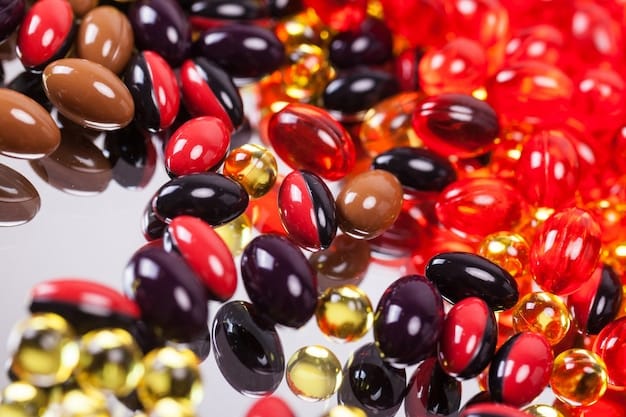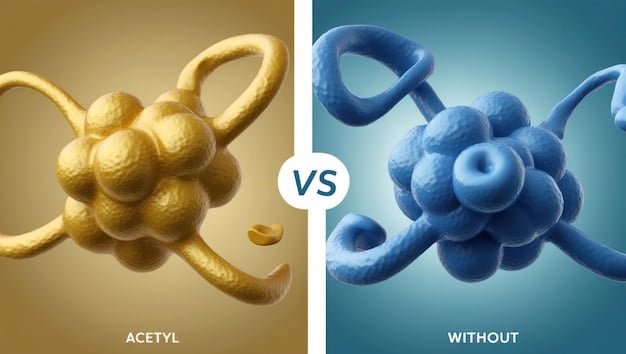How to Choose the Right CoQ10 Supplement for Anti-Aging

Choosing the right CoQ10 supplement involves understanding the different forms (ubiquinone vs. ubiquinol), dosages, absorption enhancers, and third-party certifications to maximize its anti-aging benefits.
Are you looking to slow down the aging process and boost your overall health? Choosing the right CoQ10 supplement for maximum anti-aging benefits can be a game-changer. Let’s explore how to make the best choice.
Understanding CoQ10 and its Anti-Aging Role
Coenzyme Q10, or CoQ10, is a naturally occurring compound in the body that plays a vital role in energy production and acts as a powerful antioxidant. As we age, our CoQ10 levels naturally decline, which can impact cellular function and overall health.
Supplementing with CoQ10 can help combat these age-related declines, offering numerous anti-aging benefits. However, not all CoQ10 supplements are created equal. Understanding the basics is crucial for making an informed choice.
What is CoQ10?
CoQ10 is a fat-soluble compound present in every cell of the body. It is essential for the production of adenosine triphosphate (ATP), the primary source of energy for cells. Additionally, it protects cells from damage caused by free radicals.
Why is CoQ10 Important for Anti-Aging?
As an antioxidant, CoQ10 neutralizes free radicals, reducing oxidative stress and inflammation. This protection extends to the skin, heart, and brain, all areas significantly affected by aging. By maintaining optimal CoQ10 levels, you can support cellular health and vitality, potentially slowing down the aging process.

- Energy Production: Supports efficient energy production within cells.
- Antioxidant Protection: Shields cells from damaging free radicals.
- Heart Health: Aids in maintaining cardiovascular function.
- Skin Health: Helps protect skin from oxidative damage and supports collagen production.
In summary, CoQ10 is a critical component for maintaining energy levels and protecting against age-related damage. Supplementing with the right form and dosage can provide significant anti-aging benefits.
Ubiquinone vs. Ubiquinol: Choosing the Right Form
CoQ10 comes in two primary forms: ubiquinone and ubiquinol. Understanding the difference between these forms is essential for choosing the most effective supplement. Ubiquinol is the reduced, active form of CoQ10, while ubiquinone is the oxidized form.
As we age, our body’s ability to convert ubiquinone into ubiquinol decreases. Therefore, for older adults or those with certain health conditions, ubiquinol may be the preferred choice.
Key Differences Between Ubiquinone and Ubiquinol
Ubiquinol is more readily absorbed by the body compared to ubiquinone, especially in older individuals. This enhanced absorption can lead to higher CoQ10 levels in the blood and tissues, maximizing its benefits.
Who Should Choose Ubiquinol?
Individuals over the age of 40, those with chronic illnesses, or those experiencing fatigue may benefit most from taking ubiquinol. Its superior bioavailability ensures that the body can effectively utilize the CoQ10.
- Age: Individuals over 40 may benefit more from ubiquinol.
- Health Conditions: Those with chronic illnesses or absorption issues.
- Energy Levels: People experiencing fatigue or low energy.
In conclusion, while both forms of CoQ10 offer benefits, ubiquinol’s enhanced absorption makes it a preferred choice for older adults and those with specific health needs, ensuring maximum anti-aging effects.
Dosage Guidelines for Anti-Aging Benefits
Determining the appropriate dosage of CoQ10 is crucial for achieving optimal anti-aging benefits. The ideal dosage can vary depending on individual needs, age, health status, and the specific form of CoQ10 being used.
While there isn’t a one-size-fits-all recommendation, understanding the general dosage guidelines can help you make an informed decision in consultation with your healthcare provider.
General Dosage Recommendations
For general anti-aging purposes, a dosage of 100-200 mg per day of ubiquinone is often recommended. If taking ubiquinol, a lower dosage of 50-100 mg per day may be sufficient due to its higher bioavailability.
Factors Influencing Dosage
Several factors can influence the optimal CoQ10 dosage. Older adults, individuals with heart conditions, or those taking statin medications may require higher doses to counteract the effects of aging or medication-induced CoQ10 depletion.

- Age: Older adults may require higher dosages.
- Health Conditions: Heart conditions or other chronic illnesses.
- Medications: Statin drugs can deplete CoQ10 levels.
In summary, while general guidelines exist, consulting with a healthcare professional is essential to determine the appropriate CoQ10 dosage based on individual health needs. This ensures you receive the maximum anti-aging benefits safely and effectively.
Enhancing CoQ10 Absorption for Best Results
CoQ10 is a fat-soluble compound, which means its absorption can be enhanced when taken with fats. Maximizing absorption is essential to ensure that your body can effectively utilize the supplement for anti-aging benefits.
There are several strategies you can employ to improve CoQ10 absorption, including taking it with fatty foods and choosing supplements that contain absorption enhancers.
Taking CoQ10 with Fatty Foods
Consuming CoQ10 supplements with a meal that includes healthy fats, such as avocados, nuts, or olive oil, can significantly increase its absorption. The fat helps to dissolve CoQ10, making it easier for the body to absorb and utilize.
Supplements with Absorption Enhancers
Some CoQ10 supplements are formulated with ingredients that enhance absorption. Look for supplements that contain ingredients like piperine (found in black pepper) or are formulated with lipid-based delivery systems.
- Healthy Fats: Take CoQ10 with meals containing avocados, nuts, or olive oil.
- Piperine: Look for supplements containing black pepper extract.
- Lipid-Based Delivery Systems: Enhances absorption through improved formulation.
In conclusion, improving CoQ10 absorption is crucial for maximizing its anti-aging effects. By taking it with fatty foods and choosing supplements with absorption enhancers, you can ensure that your body effectively utilizes this powerful antioxidant.
Third-Party Certifications and Quality Assurance
When choosing a CoQ10 supplement, it’s important to prioritize quality and safety. Third-party certifications provide assurance that the supplement has been tested for purity, potency, and contaminants.
These certifications help you make an informed choice and ensure that you are getting a high-quality product that delivers on its anti-aging promises.
Importance of Third-Party Testing
Third-party testing verifies that the supplement contains the stated amount of CoQ10 and is free from harmful substances like heavy metals, pesticides, and other contaminants. This verification is crucial for ensuring product safety and efficacy.
Look for Reputable Certifications
Reputable third-party certifications include NSF International, USP Verified, and Informed-Choice. These organizations have strict testing protocols and provide consumers with confidence in the quality of the supplement.
- NSF International: Tests for contaminants and verifies ingredient amounts.
- USP Verified: Ensures quality, purity, and potency.
- Informed-Choice: Certifies that products are free from banned substances.
In summary, choosing a CoQ10 supplement with third-party certifications ensures that you are getting a safe, high-quality product. This due diligence is essential for realizing the full anti-aging benefits of CoQ10.
Lifestyle Factors to Complement CoQ10 Supplementation
While CoQ10 supplementation can provide significant anti-aging benefits, its effects are amplified when combined with a healthy lifestyle. Factors such as diet, exercise, and stress management play a crucial role in overall health and longevity.
Adopting a holistic approach that includes CoQ10 along with positive lifestyle habits can maximize your anti-aging efforts and improve your overall well-being.
The Role of Diet
A diet rich in antioxidants, vitamins, and minerals supports cellular health and reduces oxidative stress. Incorporate plenty of fruits, vegetables, healthy fats, and lean proteins into your diet to complement the benefits of CoQ10.
The Importance of Exercise
Regular physical activity improves circulation, boosts energy production, and reduces inflammation. Aim for at least 150 minutes of moderate-intensity exercise per week to enhance the anti-aging effects of CoQ10.
- Balanced Diet: Focus on fruits, vegetables, and healthy fats.
- Regular Exercise: Aim for 150 minutes of moderate activity per week.
- Stress Management: Practice relaxation techniques like yoga or meditation.
In conclusion, combining CoQ10 supplementation with a healthy lifestyle can significantly enhance its anti-aging effects. By focusing on diet, exercise, and stress management, you can support cellular health and vitality, promoting overall well-being and longevity.
Potential Side Effects and Interactions
CoQ10 is generally considered safe for most people, but it’s important to be aware of potential side effects and interactions with other medications. Understanding these considerations can help you use CoQ10 supplements safely and effectively.
While side effects are rare, being informed about them can help you recognize and address any issues that may arise.
Common Side Effects
Some people may experience mild side effects such as nausea, stomach upset, or diarrhea when taking CoQ10 supplements. These side effects are usually temporary and can often be resolved by adjusting the dosage or taking the supplement with food.
Potential Drug Interactions
CoQ10 may interact with certain medications, including blood thinners, blood pressure medications, and chemotherapy drugs. It’s essential to consult with your healthcare provider before starting CoQ10 supplementation, especially if you are taking any medications.
- Gastrointestinal Issues: Nausea, stomach upset, or diarrhea.
- Drug Interactions: Blood thinners, blood pressure medications.
- Consultation: Always consult with a healthcare provider before starting CoQ10.
In summary, while CoQ10 is generally safe, being aware of potential side effects and interactions is crucial for its safe and effective use. Consulting with a healthcare provider can help you determine the appropriate dosage and ensure that it doesn’t interfere with any existing medications.
| Key Aspect | Brief Description |
|---|---|
| ⚡ Form Matters | Ubiquinol is generally better absorbed, especially for older adults. |
| 💊 Dosage | 100-200mg of ubiquinone or 50-100mg of ubiquinol daily. |
| 🥑 Absorption | Take with fatty foods or supplements with enhancers like piperine. |
| ✅ Quality | Look for third-party certifications like NSF, USP, or Informed-Choice. |
FAQ
▼
It’s generally recommended to take CoQ10 with a meal that contains fats, as it’s fat-soluble and better absorbed when taken with lipids. Consistency is key, so choose a time that fits your daily routine.
▼
Yes, CoQ10 can help protect skin from oxidative damage and UV radiation, supporting collagen production. Topical application and oral supplements can both contribute to healthier, younger-looking skin.
▼
Yes, certain foods like organ meats (such as heart, liver, and kidney), fatty fish (like salmon, tuna, and mackerel), and whole grains contain CoQ10. However, the amounts are usually not sufficient to significantly raise CoQ10 levels.
▼
It varies, but most people start to notice improvements within a few weeks to a few months. Consistency is crucial. Factors such as dosage, individual health status, and absorption efficiency can affect the timeline.
▼
Not necessarily. While some individuals may benefit from higher doses, it’s essential to stay within the recommended range and consult with a healthcare provider. Excessive doses can sometimes lead to side effects without providing additional benefits.
Conclusion
Choosing the right CoQ10 supplement for maximum anti-aging benefits involves considering the form, dosage, absorption, and quality. By understanding these factors and adopting a healthy lifestyle, you can harness the full potential of CoQ10 to support cellular health, protect against age-related damage, and promote overall well-being, leading to a vibrant and healthy life.




